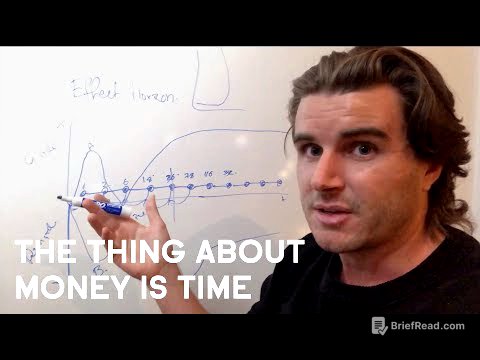TLDR;
This YouTube video by Dominion City discusses the importance of prayer and unity within the church, especially in the face of challenging times. It highlights the dangers of individualism and the need for corporate prayer and action. The sermon also touches on spiritual warfare, the nature of the last days, and how to navigate relationships with other ministries and believers, emphasising covenant practices and avoiding conflict with brethren.
- Prayer is crucial for implementation and planning.
- The church needs to operate corporately, not individually.
- Unity and partnership are essential to overcome challenges.
- Avoid fighting fellow believers and focus on the common enemy.
- Faithfulness and love are key principles for success.
The Power of Prayer and Implementation [0:03]
The speaker emphasises the importance of prayer before, during, and after hearing the word of God. He encourages immediate implementation of spiritual insights, starting with prayer. Prayer is presented as the foundation for planning, clarifying intentions, and seeking divine guidance in all matters. He warns that the devil would try to disrupt the gathering because it will disrupt his plans.
Understanding Spiritual Authority [1:10]
The speaker asserts that believers are not under the kingdom of darkness but under the Lordship of Christ, meaning satan's laws do not apply to them. He uses the analogy of different governments having jurisdiction in different territories to illustrate that satan has no authority over those in Christ. He also mentions that when God directs you to a location, visit it before asking questions to receive further guidance.
Spiritual Mapping and Departure [1:36]
Before taking possession of what God has promised, spiritual mapping is necessary, which involves physically visiting the location. The speaker references Abraham leaving his father's house and Moses sending spies as examples. He notes that people often struggle with departure, using the disciples' reaction to Jesus's departure as an example. It's important to communicate changes effectively so others can understand and accept them.
The Righteous Are Taken Away [3:02]
Drawing from Isaiah 57:1-2, the speaker explains that the righteous are often taken away to be spared from coming evil. He uses the example of the generation before Noah's flood, where righteous individuals began to pass away before the flood occurred. He suggests that a similar phenomenon is happening today, with two generations of believers: those who will be removed and a remnant generation that will be preserved through trials.
The Church's Role in the Last Days [5:05]
The speaker stresses that the church has limited time left and urges listeners to pray for open ears to hear God's specific instructions. He highlights that this conference is different, requiring everyone to seek God's guidance. He reiterates that something significant is approaching and that believers should trust God even when faced with difficult situations, understanding that those who die in faith are in a better place.
Corporate Prayer vs. Individualism [7:32]
The speaker criticises the overemphasis on individual prayer requests, which he believes has shifted the focus from a missionary project to a church project. He argues that the church's power is underutilised because of individualism, influenced by American culture. Jesus taught corporate prayer ("Our Father"), and the priesthood should be exercised corporately for greater results. Individual efforts achieve less than 10% of what is possible.
The Dangers of Selfishness [9:45]
The speaker points out that a focus on individual needs and desires leads to selfishness, which weakens the church and relationships. He uses the Lord's Prayer as an example of corporate focus, contrasting it with the individualistic mindset prevalent in American Christianity. He criticises the "it's all about me" mentality, which he believes is destroying marriages and creating wounded generations.
Christianity as a Team Sport [12:28]
The speaker asserts that Christianity is a team sport, not an individual pursuit. The opponent (principalities and powers) is well-organised, so believers must unite to confront them effectively. He uses the analogy of football, where passing the ball and teamwork are essential for scoring and winning.
Corporate Vision and Prayer [14:10]
The speaker encourages believers to pray for corporate needs and visions rather than solely focusing on personal desires. He references Paul's teaching on planting and watering, with God giving the increase. He urges listeners to seek the bigger picture and impact, trusting that their individual needs will be met within the corporate vision. He advises against approaching God with only selfish requests, emphasising the importance of including the needs of the pastor, church, the poor, and missions in their prayers.
Private Failures and Victories [16:16]
The speaker warns that private failures, especially in secret, will eventually manifest publicly. Conversely, private victories will also be revealed openly. He encourages believers to pray for others, including pastors and those from different regions, recognising the potential impact of a collective spiritual awakening.
The Deadly Disease of Individualism [17:13]
Individualism is described as a deadly disease, especially in the challenging times the church is entering. The speaker urges against divergence and disunity, promoting convergence, unity, and partnership. He warns that those who pursue individualism will become victims of their own decisions, as one can chase a thousand, but two can chase ten thousand.
Self-Humbling and Rediscovering the Church [19:15]
The speaker identifies individual ambition as a weakness that overpowers the common good, making people vulnerable. He encourages self-humbling and recognising the need for something bigger, which is the church. The goal is to rediscover the power of the church and how to deploy it, understanding that the church offers a hundred percent possibility compared to an individual's maximum of ten percent.
Synthesis and Counsel [21:42]
The speaker introduces the concept of synthesis, where bringing together opposing ideas creates a superior solution. He stresses the importance of seeking counsel and listening to others to bring balance and ensure success. He uses the example of Malcolm X and Martin Luther King Jr. during the civil rights movement, where their opposing strategies ultimately contributed to the same goal.
Avoiding Conflict and Honouring Relationships [24:59]
The speaker advises against fighting fathers, brothers, and children, as it leads to negative consequences. He explains that brothers are only allowed to fight when one breaks the rule to fight their father. He uses the example of Michael fighting Lucifer, who was once a brother but rebelled against God.
Setting Models and Avoiding Rebellion [27:20]
The speaker cautions against rebellion, stating that it permits others to rebel against you. He advises being careful about the models and standards set in ministry, as they will have long-term effects. He uses the example of David, who refused to kill Saul, even when he had the opportunity.
Team Ministry and Discipling Nations [30:18]
The speaker emphasises that ministry is a team sport, using a practical demonstration with volunteers. He clarifies that the goal is to disciple nations, and everything that has worked for Dominion City is openly shared. He criticises the American concept of competition between churches and pastors, asserting that the focus should be on the common goal of evangelising and discipling nations.
Conquering the Promised Land [33:03]
The speaker uses the analogy of conquering the promised land, which is occupied by seven mighty nations, to illustrate the church's mission. He identifies these nations as nephilim, beings with the DNA of fallen angels, resulting from sexual intercourse between fallen angels and human beings. He connects this to current efforts to create a new race through interfering with human DNA, referencing the "Lucifer race."
The Nephilim and Genetic Corruption [36:10]
The speaker explains that the genetic mutation caused by the nephilim led to God wiping out the earth with a flood in Noah's time. He notes that this genetic corruption resurfaced after the flood through the lineage of Ham. He warns that the world is being programmed to become comfortable with fallen angels, citing violent movies as an example.
The Last Days and Spiritual Warfare [38:46]
The speaker asserts that before the full manifestation of what is on the horizon, God wants to finish the last days' move of God. He contrasts biblical laws of war, which protect civilians and fruit-bearing plants, with instances where God commanded wiping out entire populations, indicating that those populations were not fully human. He suggests that this situation is about to recur in this age, as Jesus said it would be as in the days of Noah.
Technological Corruption and the Mark of the Beast [40:13]
The speaker warns of technological advancements being used to corrupt human genes and DNA, referencing GMOs and the internet of things. He explains that 5G and subsequent technologies aim to connect humans and computers, enabling the transmission of emotions and thoughts. He connects this to the mark of the beast, a microchip that turns humans into living computers, allowing for tracking and control.
Artificial Intelligence and the Image of the Beast [43:28]
The speaker describes the coming of a super-intelligent artificial intelligence that can think, feel, and know everything about everyone. He warns that the world will worship this AI, which he calls the image of the beast, similar to the image worshipped in Nebuchadnezzar's time.
Wiping Out the Lucifer Race [44:50]
The speaker states that God intends to wipe out the "Lucifer race," just as he did in the days of Noah with the flood. This time, God will use war, ordering the children of Israel to wipe out specific nations. He references Deuteronomy 7:1, listing these nations, and uses the example of Saul's incomplete obedience in wiping out the Amalekites.
The Abominations of the Nephilim [46:39]
The speaker details the abominations of the nephilim, including sodomy, bestiality, and incest, which led to their destruction. He asserts that these practices, including homosexuality, are not new but have existed since the beginning of human history. He warns that engaging in these practices leads to spiritual death and the loss of dominion.
Covenant Practices and Possessing the Land [49:30]
The speaker emphasises that to conquer evil, one must rise above it and not engage in the same practices. He notes that the Jews lost their dominion whenever they copied the atrocities of the nations they were meant to displace. He highlights the importance of adhering to covenant practices and rules when taking possession of nations and cities.
Honouring Your Spiritual Fathers [1:05:14]
The speaker stresses the importance of honouring one's spiritual fathers, even if they were not perfect. He advises against speaking negatively about past leaders and encourages gratitude for the opportunities to learn. He uses the example of David, who refused to harm Saul, God's anointed.
Respecting Boundaries and Avoiding Conflict [1:08:28]
The speaker references Deuteronomy 2, where God commands the children of Israel not to fight with their brethren, the children of Esau, Moab, and Ammon, as God has given them their own inheritance. He emphasises the importance of respecting what God has done with others so that He can do what He wants to do with you. He advises buying food and water from them rather than taking their land.
Contending with the Enemy [1:14:07]
The speaker contrasts the instructions for dealing with brethren with those for dealing with enemies. He references Deuteronomy 2:24, where God commands the Israelites to contend with Sihon, the king of the Amorites, in battle, as God has given them his land.
The Wise and Faithful Servant [1:14:52]
The speaker warns against being an evil servant who fights with fellow servants, citing Jesus's parable in Matthew 24:48-51. He contrasts this with the wise and faithful servant whom God has made ruler over his household, who gives them their meat in due season. He emphasises that God rewards faithfulness, not visibility or position.
Dealing with Conflict and Gang-Ups [1:19:49]
The speaker addresses the question of what to do when other ministers, who are not properly trained, come and fight you. He advises being the bigger person and moving to avoid conflict. He shares a story of advising a pastor to find a different space rather than competing with another church. He also discusses what to do when a group of brothers gang up against you, referencing the story of Jehoshaphat in 2 Chronicles 20.
Turning the Battle to the Lord [1:24:27]
The speaker explains that when brothers team up against you, the appropriate response is to carry the case to prayer and organise praise and worship. He emphasises that this is a different type of battle, where traditional methods of warfare will not work. He advises pushing the battle back to the mediator of the covenant, trusting that God will intervene.
Walking by Faith and Love [1:28:00]
The speaker concludes by reiterating that Dominion City has come this far by walking by faith and walking in love. He encourages listeners to observe these principles to end well. He emphasises that those who see the future are the ones who own it, while those who fail to see beyond the present make terrible mistakes.









